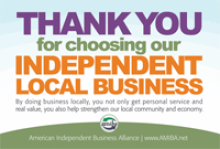Salisbury's Neighbors to State Legislature: Don't Kill Our Fibrant Dreams
Time Warner Cable's bill to kill competition by limiting the right of communities to build their own broadband networks will have a committee hearing this week in North Carolina's Senate. Stop the Cap! has details in its action alert -- we encourage people to continue contacting their Senators as well as contacting local officials and telling them to contact Senators.
We have seen some interesting news coming out of North Carolina recently, including Salisbury connecting its 500th customer to its publicly owned Fibrant network [pdf]. Additionally, some nine nearby communities have told Raleigh they want to preserve their right to be served by Fibrant (the bill would greatly limit the territory in which Fibrant can expand, unlike private companies which have the freedom to expand across the state). The story starts with a church in one of the communities, Faith:
Mahoney said his church, Faith Baptist, would like faster Internet speeds but can’t afford the $20,000 Time Warner Cable would charge to build a business-class circuit for the church. Church members are not satisfied with DSL service from Windstream, Mahoney said.



